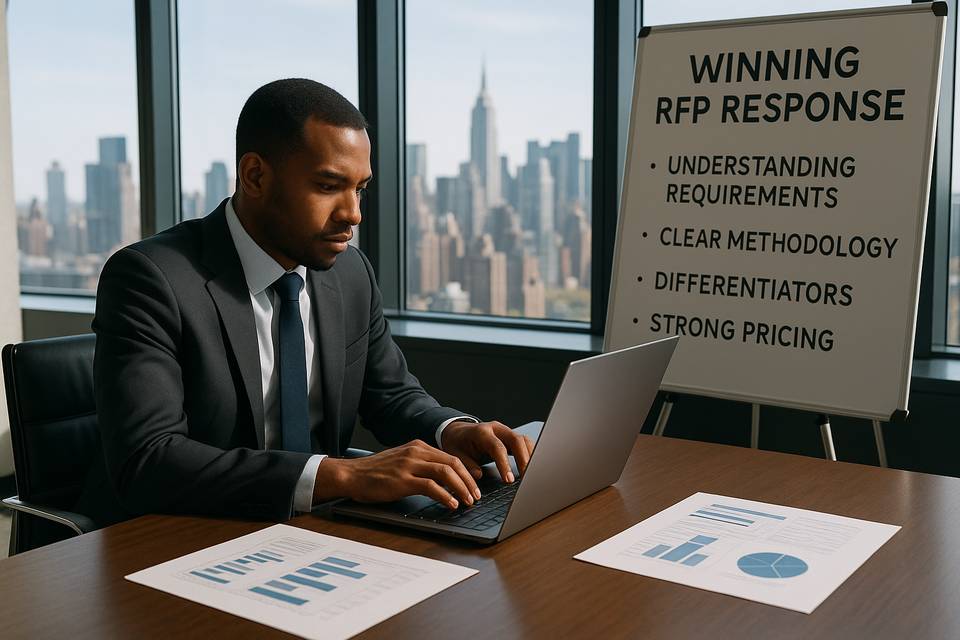Winning RFP Response Examples: Strategies for Success
Request for Proposals (RFPs) are critical tools that organizations use to solicit proposals from suppliers, contractors, and service providers. Crafting a winning RFP response can significantly enhance your chances of winning new business. In this blog post, we will dive into effective strategies, examples of winning RFP responses, and how solutions like QuestDash can aid in this process.
Understanding the Importance of RFP Responses
An RFP response serves as your first impression with prospective clients. A strong response can:
- Showcase Your Expertise: Demonstrating knowledge of the client's needs and providing tailored solutions.
- Highlight Differentiators: Explaining what sets your services apart from competitors.
- Build Credibility: Establishing your brand as trustworthy and competent.
- Real-time Collaboration Features to enable teams to work together seamlessly.
- Intuitive Dashboards for managers to track project milestones and resource allocation visually.
- Integration Capabilities with existing systems to ensure a smooth transition."
- Personalize your response by addressing the specific needs of the client and referring to their goals and challenges.
- Avoid jargon and utilize straightforward language to improve accessibility and engagement.
- Incorporate charts, tables, or infographics to present your data in an engaging way. For example:
- Share relevant success stories to illustrate your competencies and results achieved for similar projects. > Case Study: ABC Corp - Improved Efficiency by 30% This case study proved that our tailored solutions contribute to significantly enhanced effectiveness.
- Fast Turnaround: Complete complex RFPs in 2-3 hours instead of 40 hours.
- Precision and Consistency: Maintain accuracy and consistency across all documents, ensuring your brand voice is always reflected.
The Structure of a Winning RFP Response
To achieve the above objectives, your RFP response should follow a clear structure. Here are essential components:
1. Executive Summary - A concise overview of your proposal, highlighting the key points. 2. Company Background - Briefly describe your company, including relevant experience and authority in the industry. 3. Understanding of the Client's Needs - Demonstrate your comprehension of the client's challenges and goals. 4. Proposed Solution - Offer a detailed description of your approach to solving the problem, including methods and techniques. 5. Budget and Pricing - Provide clear pricing details, ensuring transparency and justification of costs. 6. Appendices - Include supporting documents, such as case studies or references.
Example of a Winning RFP Response
To illustrate, let’s consider a simplified example based on a fictitious software development company responding to an RFP for creating a project management tool:
Executive Summary
> "XYZ Software Solutions is excited to present our proposal to develop a tailored project management tool for [Client’s Name]. Our innovative approach emphasizes efficiency, user-friendliness, and scalability to meet your organization's evolving needs."Company Background
> "With over a decade of experience, XYZ Software Solutions has collaborated with several leading enterprises in streamlining project management processes, resulting in increased productivity and satisfied users. In the last year alone, we have successfully launched 50+ custom software solutions across various industries."Understanding of the Client’s Needs
> "We understand that [Client’s Name] seeks a solution to enhance collaboration among teams, improve progress tracking, and increase resource management efficiency. Our team is dedicated to addressing these pain points effectively."Proposed Solution
> "Our proposed tool will include:Budget and Pricing
> "Our estimated budget for the project is $X, which includes development, testing, and a year of post-launch support. This competitive pricing reflects our ability to deliver high-quality software while maintaining efficiency."These structured components, aligned with compelling content, create a solid foundation for a persuasive RFP response.
Tips for Crafting Effective Responses
Tailor Your Message
Use Clear and Concise Language
Utilize Visuals
| Feature | XYZ Software Solutions | Competitor A | Competitor B | |-----------------------|-------------------------------|-------------------|-------------------| | Real-time Collaboration| Yes | Yes | No | | Customization | High | Medium | Low | | Pricing | Competitive | Higher | Competitive |
Include Case Studies
Automating Your RFP Responses with QuestDash
With the rising demand for quality proposals and the need for efficiency, automation tools like QuestDash are becoming indispensable. Let’s look into how QuestDash can streamline your RFP response process:
Smart Automation
QuestDash utilizes AI technology to automate RFP responses, producing high-quality drafts in a fraction of the time it would normally take:
Up-to-Date Information
QuestDash connects to your existing knowledge sources, ensuring the information generated is current and relevant. This minimizes the risk of sending outdated data, enhancing your response’s credibility.Conclusion
Crafting winning RFP responses is not just about writing well; it’s about strategically addressing the client's needs and presenting your solutions clearly and convincingly. By utilizing structured responses, tailoring your message, and incorporating modern technologies such as QuestDash, you can significantly enhance your team's productivity and RFP conversions.
By implementing the tips and strategies outlined here, you are well on your way to improving your proposal success rate and securing new business opportunities.


